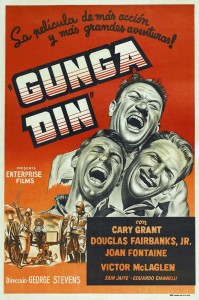How much would you enjoy a film which was made more than 70 years ago? Would you like the production quality? If it was an “Action Film”, will it still be entertaining enough?
I had these questions when I sat down to watch ‘Gunga Din’ one Saturday evening. I must say I was surprised how strongly this film allayed my wariness of old films.
Plot
The film is set in the late 19th Century India under the British Rule. A small town has been overrun and the Telegraph office has been destroyed. A small detachment of 25 soldiers and 6 attendants is sent under the command of three officers, MacChesney, Cutter and Ballentine , on a reconnaissance mission to find what happened and to repair the telegraph. They find the town deserted and evidences of an attack by the Thugee who were said to have been eliminated 50 years back. All of a sudden they are attacked by hoards of Thugee from all sides and fight through the attack and reach their garrison. One of the survivors is Gunga Din, a lowly water bearer who aspires to become a soldier in the Queen’s army.
Ballentina is due to leave the army in a few days and get married but his other two friends keep conspiring to have him stay in the army with them. One day Gunga Din comes to Cutter and tells him that he has found a temple of gold. They sneak out in the night and reach the temple only to find out that it is the Headquarter of a large Thugee army. Cutter creates a distraction to get arrested while Gunga Din manages to escape and inform MacChesney and Ballentine of his capture. In their foolhardy bravado, they march to the temple alone and too get arrested.
However, they manage to make the Guru of the Thugee hostage. The Guru tells them that he has led a trap for the British army which is coming this way and that they will be led on and slaughtered by his man. However, seeing that his men are unwilling to leave him and go for the battle, the Guru jumps in a pit of snakes and kills himself. As the British army marches towards doom, Gunga Din makes a desperate attempt to alert them. He crawls to the top of the temple and sounds the trumpet, thus alerting the British army. Gunga Din is cut down by a volley of gun fire but manages to save the army. The Thugee’s plan to attack the British army is foiled and they are routed in the battle that ensues. After the battle, Gunga Din is honored and made a Corporal posthumously. As he lies dead, Cutter reads the lines from Kipling’s poem:
“Though I’ve belted you and flayed you,
By the livin’ Gawd that made you,
You’re a better man than I am, Gunga Din!”
Observation
The simplicity of this film is what makes its so special. Here we have three young brats for whom war is a game, chivalry is a way of life; and life, another practical joke. They keep drinking, brawling and showing their bravado even in the face of grave mortal danger. Also noteworthy is their friendship; in fact, ‘Gunga Din’ is considered among the greatest buddy movies ever.
So the big question, does the film entertain? Oh yes! It does! And for a film made in 1939, it does so beautifully! The performances are good, the comedy is intentional and the larger than life picturization of the Sergents of Queens army is believable. The Cinematography is of an exceptional quality, India had been recreated in the ravines of America so beautifully that one who doesn’t know this fact will never think that it was not in India that this film was shot. Most noteworthy are the action sequences in this film, the battle at the end is something epics are made of. It has been made even greater due to the natural tones of black and white.
There are some films about which you may not have much of a prior knowledge; but while you are watching them, you get the feeling that your are experiencing something special. I had this feeling first when I was watching ‘Munich’ without knowing that it was a Spielberg neo classic. ‘Gunga Din’ gave me the same feeling. No wonder this film is considered as a part of the American Heritage and inspired many great films of the later era like the Indiana Jones. A compelling watch !
Details
| Directed by | George Stevens |
| Produced by | George Stevens |
| Written by |
|
| Starring |
|
| Music by | Alfred Newman |
| Cinematography | Joseph H. August |
| Editing by | Henry Berman |
| Release date(s) | February 17, 1939 |
| Running time | 117 min. |
| Language | English |
| Budget | $2 million |
====
PS: This happens to be the 100th post in Shadows Galore. 10 months and 26000 visitors on, today I take the opportunity to thank you all for the love and support you have shown for our blog. With your encouragement, we will keep striving for betterment 🙂


thanks for the information will watch it soon
Thanks Chirag
Wow! Where can i lay my hands on this one? Would u be able to help or should i rely on google?
Do you use Dropbox ? 😛